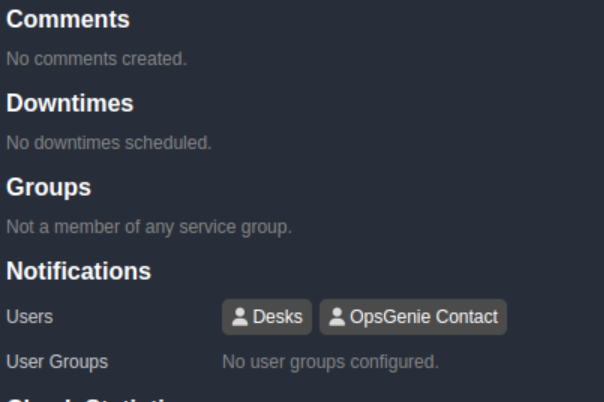Hey,
I’m using Icinga r2.13.7-1 with Director and I’m struggling with notifications configuration to be sent to multiple users.
First user is called Desks, and second one is the opsgenie user for the opsgenie integration.
If there are both assigned, notifications are usually sent to Desks. If there is only opsgenie user, it works as well and opsgenie is receiving notification.
Let’s say I have a disk_usage check and host chd-dev-test001
This is what I see in the logs:
[2024-07-26 09:12:03 -0500] information/Checkable: Checkable 'chd-dev-test001!disk_usage' has 3 notification(s). Checking filters for type 'Problem', sends will be logged.
[2024-07-26 09:12:03 -0500] information/Notification: Sending 'Problem' notification 'chd-dev-test001!disk_usage!everyone-service-apply-warning-to-critical' for user 'Desks'
[2024-07-26 09:12:03 -0500] information/Notification: Completed sending 'Problem' notification 'chd-dev-test001!disk_usage!everyone-service-apply-warning-to-critical' for checkable 'chd-dev-test001!disk_usage' and user 'Desks' using command 'mail-service-notification'.
Output from icinga2 object list --type "Notification" | grep chd-dev-test001
Object 'chd-dev-test001!disk_usage!everyone-service-apply' of type 'Notification':
* __name = "chd-dev-test001!disk_usage!everyone-service-apply"
* host_name = "chd-dev-test001"
Object 'chd-dev-test001!disk_usage!notify-opsgenie-service' of type 'Notification':
* __name = "chd-dev-test001!disk_usage!notify-opsgenie-service"
* host_name = "chd-dev-test001"
Users definitions:
object User "opsgenie" {
import "generic-user"
display_name = "OpsGenie Contact"
enable_notifications = true
}
object User "Desks" {
import "user-template"
enable_notifications = true
states = [ Critical, Down ]
}
Notifications definitions:
apply Notification "everyone-service-apply" to Service {
command = "mail-service-notification"
assign where host.vars.notification_useremail && (service.name == "cpu_throttling" || match("disk_usage*", service.name) || match("memory*", service.name) || service.name == "ssh" || match("mysql_slave*", service.name))
states = [ Critical, OK ]
types = [ Custom, Problem, Recovery ]
users = [ "Desks" ]
vars.notification_from = "support@example.com"
}
apply Notification "notify-opsgenie-service" to Service {
command = "opsgenie-service-notification"
assign where service
states = [ Critical, OK, Warning ]
types = [ Problem, Recovery ]
users = [ "opsgenie" ]
}
If anyone has an idea what is wrong with this approach, please let me know, I run out of ideas.
This is what I see in the GUI for this specific check, not sure where I can find this in the config
